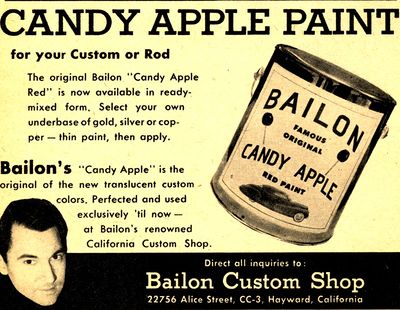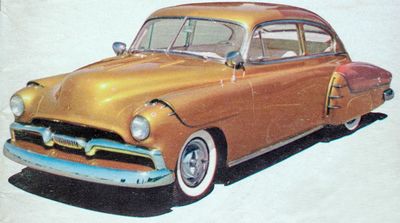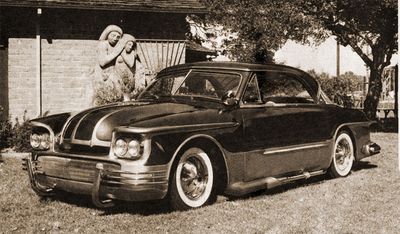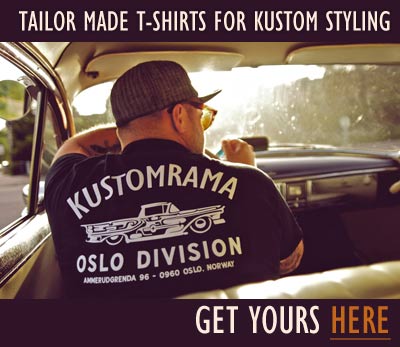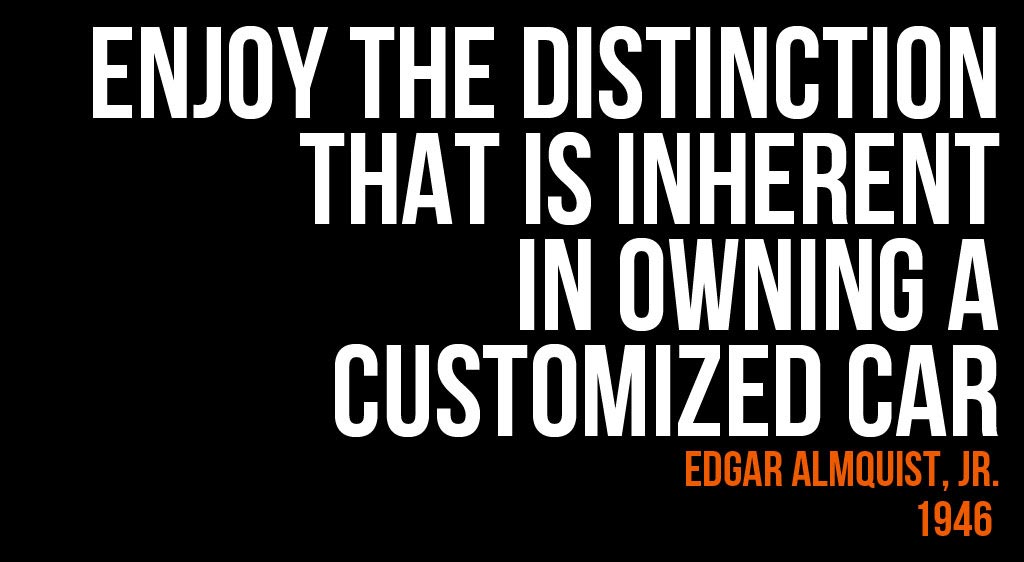Candy Paint

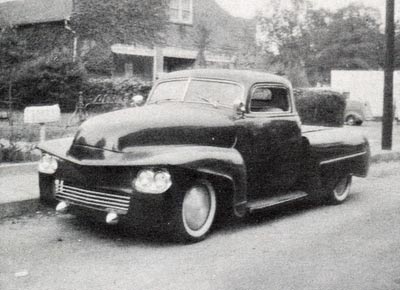
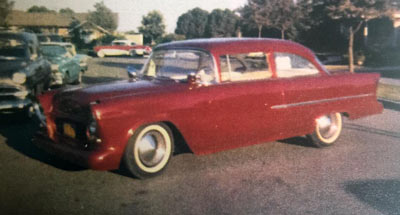

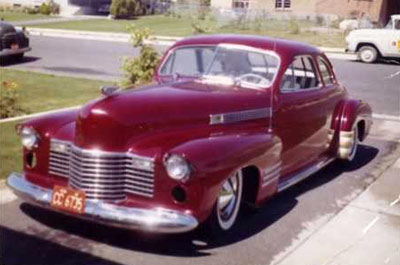
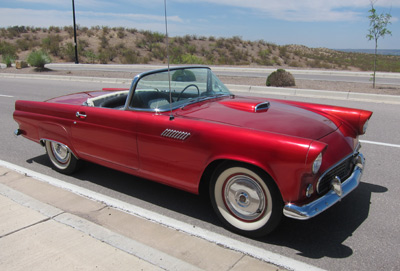
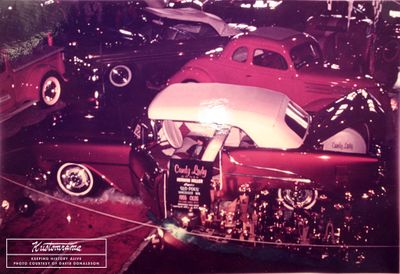

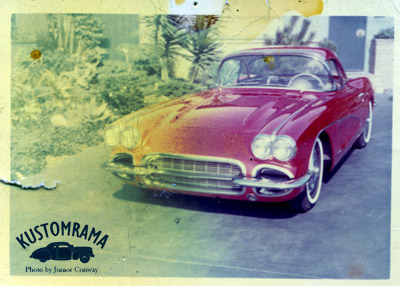

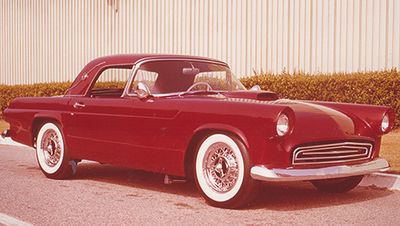
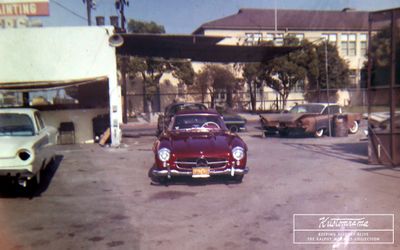
Many people were experimenting with paint in the 1950s, trying to achieve a candy effect. Amongst them were known painters and customizers such as Joe Bailon and Mel Pinoli. In 1953 Buick came up with a color named Titian Red for its 1954 model. The Titian Red became a very popular color at the time, and was widely used on many mid and late 1950s custom cars. The color was as close to a candy color you could come before real candys were being done. The color was very transparent and it could be affected by what was used as a base color underneath it.[1]
In the mid 1950s Mel Pinoli of Pinoli's Body and Paint Shop was experimenting with translucent colors, trying to find the secret to what would eventually be called Candy Apple. He combined different amounts of toner and clear, but the results weren't very good. On his way to achieve the look he also tried to paint Frank Livingston's 1949 Chevrolet with printing dyes from California Ink. The effect was good, but the paint faded fast and badly. He knew that the ink weren't the answer so he went back to the toners. Eventually, he hit upon a combination of toner and color that worked. In 1955 Mel laid what is known as the first Candy Apple paint job. The car was a 1950 Chevrolet belonging to Ted Leventhal. At the time the paint was applied it was called green iridescent lacquer. Joe Bailon is often credited as being the first to apply candy paint. He may have been the first to apply candy red, but Pinoli was responsible for the first candy paint job.[2]
At young age, Joe Bailon was impressed with the golden maroon sunset over the San Francisco Bay. He was so impressed in fact that red became his favorite color. When he later began mixing paints, he tried to achieve a color that was similar to that of a car's taillight reflected on a rainy street; real brilliant, almost with a glow from deep within itself. He experimented with various ideas for a long time. His work lead into what became known as candy apple colors. Candy Apple Red was ofcourse the first. What he wound up with after a lot of experimenting was a red-toned clear lacquer sprayed over a bright red dye, not a paint, which, in turn, had been put over a gold underbase. After inventing the paint Joe marketed the paint in several shades for a while. Candy Apple wasn't any tangible product, but a method of application, so once a shop had ordered Joe's paint and read the instructions for applying it they could go right ahead and paint hundreds of cars without buying a drop of paint from Joe. Before the Candy Apple came along Joe had tried to duplicate the coloring on the sides of a set of Slingerland or Ludwig drums. That rich, flaky, transparent color that is actually a sheeting of molded plastic. The sparkle in the stuff was given off by light rays reflecting from the facets of minute silvery particles. He tried to match this by mixing salt into certain paints, and got a fair result. The he hit upon adding the silver flakes that people sprinkle on Christmas trees. He had to rework a spray gun to get it through the nozzle. The car he used it on turned out real well. It was after this that he came up with Candy Apple. Candy Apple became such a success that he forgot about the flake-like paint. Then before he knew it someone else came along and "discovered" Metalflake.[3]
Cars Featuring Candy Paint Jobs
Ray McMullin's 1941 Cadillac Coupe
Jim and George Bernardo's 1948 GMC Pickup
Ted Leventhal's 1950 Chevrolet Convertible
Duane Steck's 1954 Chevrolet Bel-Air - The Moonglow
Al Peirish's 1954 Ford Skyliner
John McLaughlin's 1955 Chevrolet
Charles McDonald's 1955 Ford Thunderbird
Tom Kosulandich's 1955 Ford Thunderbird - The Sundowner
Herman Miller's 1955 Oldsmobile Convertible - "Candy Lady"
Rich Wroblewski's 1958 Chevrolet Impala - Jade East
Bob Croatti's 1959 Ford Thundrbird
Pat Ward's 1961 Chevrolet Corvette
References
- ↑ Gordy Brown
- ↑ Barris Kustom Techniques of the 50's Volume 4
- ↑ Joe Bailon Custom Comeback by Spencer Murray
Did you enjoy this article?
Kustomrama is an encyclopedia dedicated to preserve, share and protect traditional hot rod and custom car history from all over the world.
- Help us keep history alive. For as little as 2.99 USD a month you can become a monthly supporter. Click here to learn more.
- Subscribe to our free newsletter and receive regular updates and stories from Kustomrama.
- Do you know someone who would enjoy this article? Click here to forward it.
Can you help us make this article better?
Please get in touch with us at mail@kustomrama.com if you have additional information or photos to share about Candy Paint.
This article was made possible by:
SunTec Auto Glass - Auto Glass Services on Vintage and Classic Cars
Finding a replacement windshield, back or side glass can be a difficult task when restoring your vintage or custom classic car. It doesn't have to be though now with auto glass specialist companies like www.suntecautoglass.com. They can source OEM or OEM-equivalent glass for older makes/models; which will ensure a proper fit every time. Check them out for more details!
Do you want to see your company here? Click here for more info about how you can advertise your business on Kustomrama.
